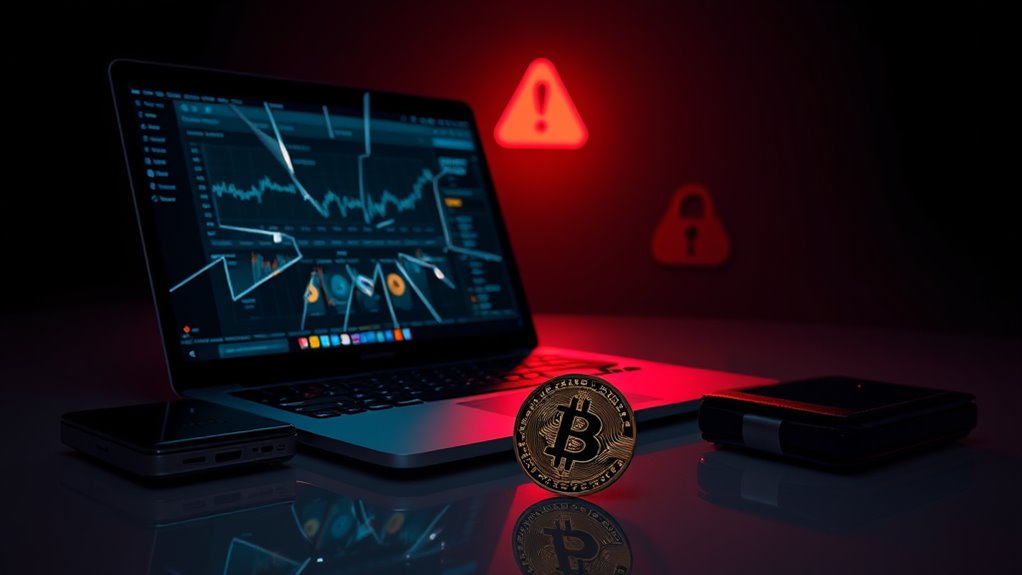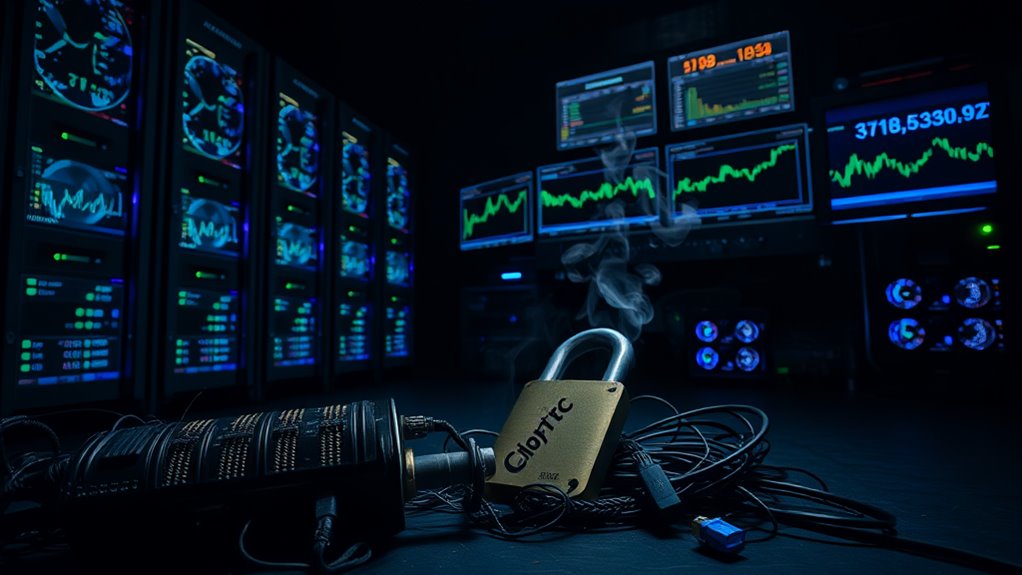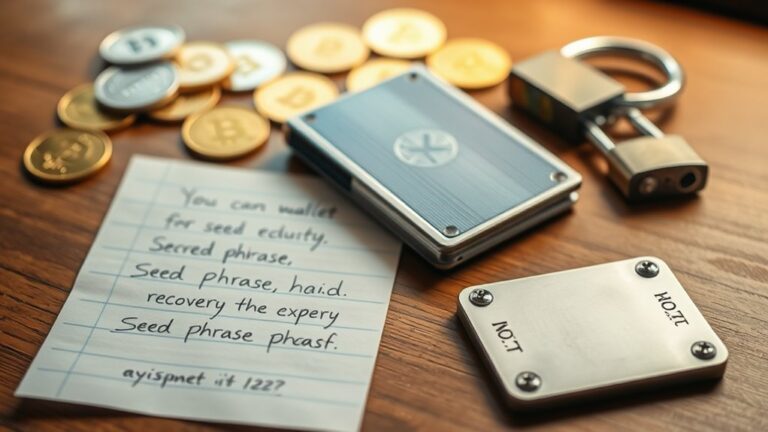Understanding Data Breaches in Cryptocurrency
Note: This post may contain affiliate links, and we may earn a commission (with No additional cost for you) if you purchase via our link. See our disclosure for more info. The gold and crypto world is constantly changing. This is not financial, investment, legal, or professional advice. So, please verify the information on the gold and cryptocurrency provider’s websites.
Data breaches in cryptocurrency are a nightmare for investors. Hacks and exploits happen, and they can hit hard. Just look at zkLend losing $9.5 million or Bybit's cold wallet being drained of $1.46 billion. North Korean hackers racked up $1.34 billion in 2024 alone! These breaches expose the vulnerabilities lurking in crypto. There's a risky game at play, and it's easily overlooked. Want to know more about the wild world of crypto security?

In a domain where digital currency reigns supreme, the reality of data breaches looms large. Cryptocurrency enthusiasts often bask in the glow of decentralized finance, but lurking in the shadows are hackers, ready to pounce. Just look at what happened in February 2025. zkLend lost a staggering $9.5 million thanks to a smart contract exploit. That's right, 3,600 Ethereum just vanished into thin air. One minute you're riding the crypto wave, and the next, you're left holding an empty wallet.
In the thrilling realm of crypto, one moment of bliss can swiftly turn into a nightmare of lost fortunes.
But it gets worse. Bybit, one of the major players in the crypto exchange arena, faced a catastrophic breach of their ETH cold wallet. Can you imagine? A whopping $1.46 billion snatched away. That's not pocket change; that's a full-blown heist! Who needs a movie plot when you have real-life cybercriminals pulling off these jaw-dropping feats? Implementing robust KYC procedures remains essential for exchanges to verify user identities and reduce the risk of fraud across the cryptocurrency ecosystem.
And let's not forget about North Korea. They're not just launching missiles; they're launching cyber attacks too. In 2024, state-sponsored actors from the rogue nation managed to steal $1.34 billion in cryptocurrency. Their targets? Private keys and exchanges. It's like they're playing a high-stakes game of Monopoly, but instead of fake money, they're raking in the real deal. How charming.
Then there's the case of DMM Bitcoin. While specifics may be murky, one thing is clear: the cryptocurrency landscape is riddled with vulnerabilities. It's a veritable buffet for hackers, and they're feasting. The irony? Many crypto investors believe their assets are safe, shielded by the technology they trust. In fact, major data breaches such as the one impacting GrubHub, which affected personal information of multiple stakeholders, highlight the broader risks within the tech landscape. Decentralization helps mitigate these risks by reducing the likelihood of single points of failure.
In the end, the cryptocurrency domain is a double-edged sword. On one side, there's the allure of financial freedom. On the other, a minefield of data breaches waiting to happen. So, while users revel in this digital revolution, they'd better keep their eyes peeled. Because in the domain of crypto, one moment of complacency can lead to catastrophic losses.
Frequently Asked Questions
What Are the Main Causes of Cryptocurrency Data Breaches?
Cryptocurrency data breaches? Oh, they're not rare! API vulnerabilities, misconfigured systems, and weak private key management are just the tip of the iceberg.
People store keys on hot wallets—brilliant, right? Phishing scams? Classic move!
And let's not forget those centralized exchanges, just waiting to be hacked. Poor security audits, excessive hot wallet funds, and bad practices make it a playground for cybercriminals.
It's a mess, really—a digital Wild West.
How Can I Protect My Cryptocurrency From Data Breaches?
Protecting cryptocurrency from data breaches? It's a minefield.
First, ditch the hot wallets. Seriously, they're like leaving your front door wide open. Go for hardware wallets or cold storage; they're safer.
Use two-factor authentication—because one password isn't enough.
Oh, and don't fall for phishing scams; they're everywhere.
Monitor transactions like a hawk.
Regular updates? Yeah, you need those.
Educate yourself! Ignorance isn't bliss when your money's on the line.
What Should I Do if My Data Is Breached?
When data gets breached, panic isn't the answer. First, change those passwords—like, yesterday. Use unique ones, please.
Multi-factor authentication? Yes, make it happen! Keep an eye on your accounts; weird activity is a red flag.
Isolate any compromised systems to stop the bleeding. Call in the experts to figure out what went wrong.
And for goodness' sake, notify anyone affected. Ignoring it won't make it disappear. Trust us, it's a mess.
Are All Cryptocurrencies Equally Vulnerable to Data Breaches?
Not all cryptocurrencies are created equal when it comes to vulnerability. Some shine like a beacon, while others? A disaster waiting to happen.
Centralized exchanges? Major red flags. Decentralized ones? They've had their share of chaos too.
And let's not forget human error—weak passwords are a hacker's best friend. It's a mixed bag. The bad guys are always lurking, ready to pounce on the slightest mistake.
How Do Data Breaches Affect Cryptocurrency Prices?
Data breaches hit cryptocurrency prices like a freight train. Hackers swipe millions, and bam—confidence crumbles.
Think of it as a rollercoaster: one breach, and the market dips. Investors panic. They pull back, trading slows, and prices tumble.
Regulatory eyes widen, creating a cloud of uncertainty. It's chaotic. When trust evaporates, so does the stability.
Each hack just adds fuel to the fire, making everyone wonder: how low can it go?













One Comment